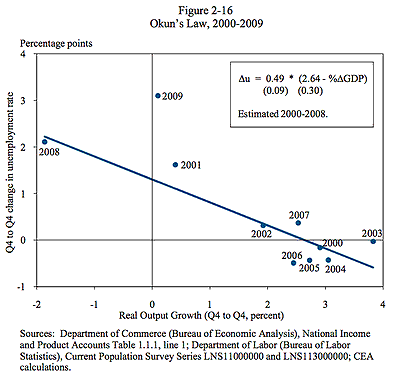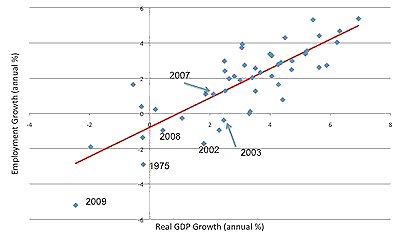There are growing concerns about the labor market performance in the US during the current crisis, concerns that might extend to the recovery phase. Unemployment has risen faster than in any previous recession, even taking into account the depth of the recession. As Brad DeLong, Robert Gordon and many others have pointed out, 2009 is a clear outlier in the relationship between unemployment (changes) and output growth, known as Okun’s Law. See chart below borrowed from Brad DeLong’s blog.

Here is an alternative view of the labor market dynamics during this time but focusing on employment growth rather than unemployment rate changes, which are affected by decisions regarding labor market participation (this is also the US economy).

The year 2009 remains an outlier in this chart: employment growth was much lower than what GDP growth would suggest, based on the historical relationship captured by the red (regression) line. Of course, this means that productivity was growing faster than normal that year, at least as measured as GDP per employee.
It is also interesting to see that 2007 and 2008 were normal years – so it cannot be an argument that prior to 2009 companies were hiring “too many” workers.
The chart also shows how the last recovery (2002 and 2003) are also outlier years where employment growth was below what was suggested by GDP Growth.
Why is employment growth being so weak in these years? Are there significant structural changes in terms of sectoral composition that can explain the weak behavior of employment growth? For 2009, did restrictions on access to credit cause an abnormal behavior by companies when it comes to hiring and firing? If we are talking about structural changes, we cannot expect a fast recovery in the labor market. If it is all a matter of credit availability then there is some hope that as the economy recovers we see a quick recovery in employment that will feed into faster GDP growth.
- Bulenox: Get 45% to 91% OFF ... Use Discount Code: UNO
- Risk Our Money Not Yours | Get 50% to 90% OFF ... Use Discount Code: MMBVBKSM
Disclaimer: This page contains affiliate links. If you choose to make a purchase after clicking a link, we may receive a commission at no additional cost to you. Thank you for your support!



Leave a Reply